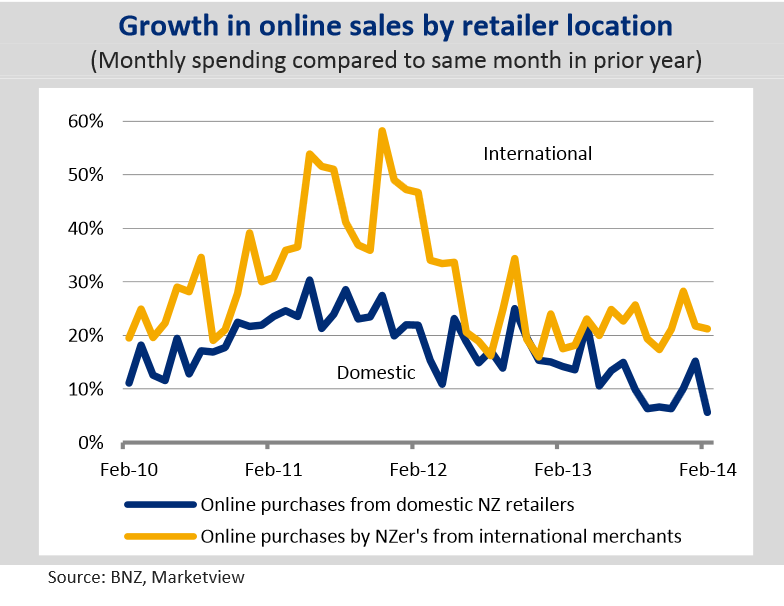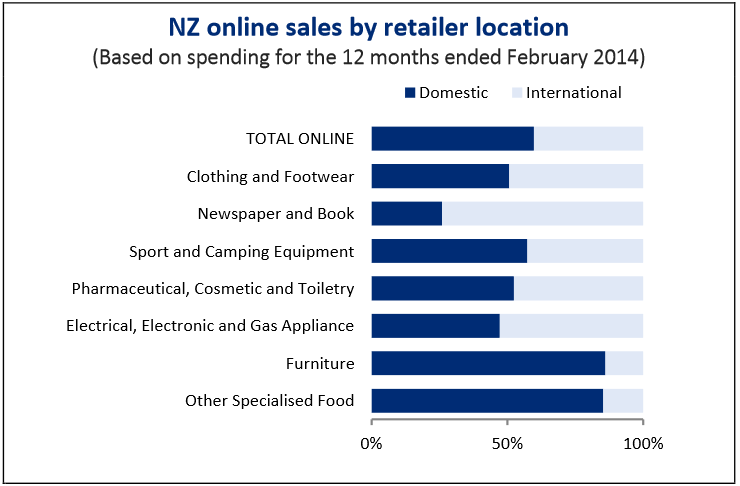The latest BNZ Online Retail Sales Index (covering the 12 months till the end of February 2014), shows continued growth in online shopping – but with Kiwis continuing to buy more and more from international stores.
Specifically:
- 42% of NZ online retail purchases in February were from international merchants
- Online purchases at offshore merchants were 21% higher than in February 2013
- Online purchases at domestic sites were just 6% higher than in February 2013
Here’s how the sector has been trending over the last five years:
The BNZ report also drills down into exactly which product categories are being purchased from international sites:
No great surprise to see that Furniture is predominantly purchased from Kiwi suppliers: international freight costs for large items remain a significant barrier.
The BNZ reports that:
At domestic merchants, online sales in February were up strongly for Supermarket & Groceries, Other Specialised Food, Department Stores, and Pharmaceuticals & Cosmetics.
[However] domestic online sales of Clothing, Liquor, Electrical Appliances, and sales at specialist Daily Sales sites, were all softer than in February last year.
Why are domestic online retail sales lagging behind?
Yes, relative product costs can be a significant factor — internationally-sourced items offered locally can include margins for the importer, distributer and the retailer, resulting in substantial premiums for “buying locally”. However, as recent research by Sapere (“The value of internet services to New Zealand businesses“, March 2014) suggests, another key factor is local retailers’ reluctance to embrace online sales:
In retail, all our respondents with an online store said it was their fastest growing channel, but (apart from the online-only operators) online was still a small minority of sales. One major chain thought that, despite extensive effort and very large investments, they were still only 1-2% of the way towards the frontier of what was possible.
One service provider suggested that no more than 1 in 12 of New Zealand retailers were really doing a good job of integrating online and offline stores. “The others are just online by default or because they think they have to be, but it is costing them a lot, and it brings new hassles, they have to do it all themselves, and they are not sure whether it will work at all”
Sapere continues:
Retailers are experimenting online but there is still much to do. Internet services are seen as important and effective for marketing and, for a small but growing number of firms, for sales. The competitive impacts of total price transparency enabled by online shopping and competition from online and overseas retailers are evident for retailers operating in some categories. We estimate that a retailer making more extensive use of Internet services is 7% more productive than the average retailer.
The Sapere report included a number of interviews with NZ retailers, sharing their perspective on online retail:
One interviewee said that she foresaw a gloomy future for retailers selling goods exposed to overseas online competition who did not have a strong brand or a point of difference. Bearing this out perhaps, we spoke to a jewellery retailer with a strong point of difference who saw no threat from the Internet. For that business the website and social media were channels for branding and advertising, and a useful addition to the print plus word of mouth model that had prevailed for a long time as the way to get work.
It was not clear in general in what circumstances online retail would add to total sales, whether it would just take share from another competitor or from the offline store, or whether it was additive to sales overall. Some interviewees said that they were just pursuing every angle that they could that might generate more business, and expanding on the things that seemed to work. One interviewee took the view that online sales were not additive at all at the sectoral level, i.e., it was just boosting competition and shifting sales between competitors.
One larger clothing retailer told us that an integrated online/offline/telesales strategy was working, but that it had taken a long time to figure out how to get the different elements to work together rather than competing with each other. This interviewee also said that having an offline store in an area helps to boost online sales in that area: perhaps customers are more confident to shop online if they know that there is an offline store as well.
Another large chain told us that its online store had a clear, material and positive impact on total sales, that customers spent more online than in store, and that this was because the online environment could better meet customer needs, rather than just diverting business from competitors.
One retail service provider was cautiously optimistic about the overall impact of the Internet on retail. “Online is certainly taking away instore sales to some extent, but it is also an opportunity to capture customers who are browsing online. Comparison shopping is now so easy, consumers are price conscious and better informed, but they are willing to purchase online or come in store if they find what they want and they know that you have it.”
Succeeding in Online Retail
All this research leads us to conclude that if the only thing that differentiates you from other retailers selling the same products is your geographic location (eg yours is the only shop in Gore selling these products), you’re going to fail at online retail.
Conversely (and we first made this point in 2005, in our book “Trade Me Success Secrets“), your best opportunity lies in offering unique, personalised items with a high perceived value, so that you’re effectively providing both uniqueness and a great deal.
What was true for Trade Me in 2005 (competing with thousands of other Kiwi sellers) is even more relevant in 2014, when you’re competing with millions of other sellers from around the world.
Location matters — but only if:
- you know what your local/regional/national customers really want, and give it to them through your customised products and services
- your delivery times are quicker as a result of being close to your customer
- your delivery costs are also lower as a result (did you know that free shipping is more attractive than a discount in most cases?)
If you’d like to know more about online retail for New Zealand businesses, check out our Mastering eCommerce course


Pingback: tylerkeesing
Pingback: Where Kiwis Shop Online | Digital Honcho